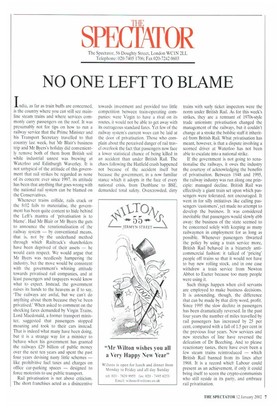NO ONE LEFT TO BLAME
India, as far as train buffs are concerned, is the country where you can still see mainline steam trains and where services commonly carry passengers on the roof. It was presumably not for tips on how to run a railway service that the Prime Minister and his Transport Secretary travelled to that country last week, but Mr Blair's business trip and Mr Byers's holiday did conveniently remove both of them from British soil while industrial unrest was brewing at Waterloo and Edinburgh Waverley. It is not untypical of the attitude of this government that rail strikes be regarded as none of its concern: ever since 1997, its attitude has been that anything that goes wrong with the national rail system can be blamed on the Conservatives.
Whenever trains collide, rails crack or the 8:02 fails to materialise, the government has been quite content to hide behind the Left's mantra of 'privatisation is to blame'. Had Mr Blair or Mr Byers the guts to announce the renationalisation of the railway system — by conventional means, that is, not by the underhand method through which Railtrack's shareholders have been deprived of their assets — he would earn respect. We would argue that Mr Byers was needlessly hampering the industry, but the move would be consistent with the government's whining attitude towards privatised rail companies, and at least passengers and taxpayers would know what to expect. Instead, the government raises its hands to the heavens as if to say, 'The railways are awful, but we can't do anything about them because they've been privatised.' When asked to comment on the shocking fares demanded by Virgin Trains, Lord Macdonald, a former transport minister, suggested that passengers stopped moaning and took to their cars instead. That is indeed what many have been doing, but it is a strange way for a minister to behave when his government has granted the railways £29 billion of public money over the next ten years and spent the past four years devising nasty little schemes — like prohibitive fuel taxes and charges on office car-parking spaces — designed to force motorists to use public transport.
Rail privatisation is not above criticism. The short franchises acted as a disincentive
towards investment and provided too little competition between train-operating companies: were Virgin to have a rival on its routes, it would not be able to get away with its outrageous standard fares. Yet few of the railway system's current woes can be laid at the door of privatisation. Those who complain about the perceived danger of rail travel overlook the fact that passengers now face a lower statistical chance of being killed in an accident than under British Rail. The chaos following the Hatfield crash happened not because of the accident itself but because the government, in a now familiar stance which it adopts in the face of every national crisis, from Dunblane to BSE, demanded total safety. Overcrowded, dirty
trains with surly ticket inspectors were the norm under British Rail. As for this week's strikes, they are a remnant of 1970s-style trade unionism: privatisation changed the management of the railways, but it couldn't change at a stroke the bolshie staff it inherited from British Rail. What privatisation has meant, however, is that a dispute involving a scorned driver at Waterloo has not been able to escalate into a national strike.
If the government is not going to renationalise the railways, it owes the industry the courtesy of acknowledging the benefits of privatisation. Between 1948 and 1995. the railway industry was run along one principle: managed decline. British Rail was effectively a giant train set upon which passengers were tolerated, not encouraged. It went in for silly initiatives like calling passengers 'customers', yet made no attempt to develop the business. It was considered inevitable that passengers would slowly ebb away: the business of the state seemed to be concerned solely with keeping as many railwaymen in employment for as long as possible. Whenever passengers thwarted the policy by using a train service more, British Rail behaved in a bizarrely anticommercial fashion: it talked of 'pricing' people off trains so that it would not have to buy new rolling stock, and in one case withdrew a train service from Newton Abbot to Exeter because too many people were using it.
Such things happen when civil servants are employed to make business decisions. It is astounding, though, the difference that can be made by that dirty word, profit. Since 1995 the slow decline in passengers has been dramatically reversed. In the past four years the number of miles travelled by rail passengers has increased by 25 per cent, compared with a fall of 1.5 per cent in the previous four years. New services and new stretches of line have reversed the defeatism of Dr Beeching. And to please reactionary tastes, there have even been a few steam trains reintroduced — which British Rail banned from its lines after 1968. It is a record which Labour could present as an achievement, if only it could bring itself to scorn the crypto-communists who still reside in its party, and embrace rail privatisation.


























































 Previous page
Previous page